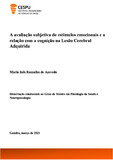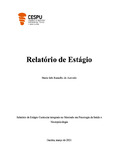| dc.contributor.advisor | MONTEIRO, LUÍS MANUEL COELHO | |
| dc.contributor.author | Azevedo, Maria Inês Ramalho de | |
| dc.date.accessioned | 2021-07-23T14:26:32Z | |
| dc.date.available | 2021-07-23T14:26:32Z | |
| dc.date.issued | 2021 | |
| dc.identifier.uri | http://hdl.handle.net/20.500.11816/3638 | |
| dc.description.abstract | A lesão cerebral adquirida (LCA) conduz frequentemente a sequelas incapacitantes nos domínios emocional e cognitivo, que possuem implicações no posterior ajustamento pessoal, social e vocacional desta população. No que respeita à experiência emocional subjetiva na LCA, a investigação não é consensual e possui um foco predominante no afeto facial. Com efeito, este estudo pretendeu, como objetivo primário, averiguar se a LCA conduz a um comprometimento na capacidade de avaliar subjetivamente imagens evocativas complexas que representam aspetos da vida real e quotidiana. Por outro lado, não é totalmente clara a relação entre o processamento emocional desta população e as alterações cognitivas que frequentemente exibem. Deste modo, procurou-se compreender esta relação num segundo objetivo deste estudo. Métodos: Doze imagens de conteúdo agradável, neutro e desagradável, selecionadas a partir do International Affective Picture System (IAPS), foram apresentadas a 52 participantes com LCA e 33 indivíduos saudáveis do grupo de controlo que as avaliaram nas escalas de valência e de ativação do Self-Assessment Manikin (SAM). Foram ainda administrados o Montreal Cognitive Assessment (MoCA) e o INECO Frontal Screening (IFS) ao grupo com LCA, visando avaliar o desempenho cognitivo geral e o funcionamento executivo destes indivíduos, respetivamente. Resultados: Os grupos apresentaram diferenças significativas na avaliação subjetiva dos estímulos. Mais especificamente, os pacientes com LCA avaliaram as imagens agradáveis como mais agradáveis e as desagradáveis como mais desagradáveis em comparação ao grupo de controlo. Além disso, os indivíduos com LCA avaliaram as imagens agradáveis e neutras como mais ativadoras relativamente aos controlos. O grupo com LCA evidenciou ainda défices no desempenho cognitivo geral e no funcionamento executivo em particular. Contudo, não foi encontrada nenhuma relação significativa entre estes défices e as diferenças na sua resposta subjetiva aos estímulos. Conclusão: Os nossos resultados evidenciam que os indivíduos com LCA apresentam um comprometimento na capacidade de avaliação dos estímulos emocionais em termos de valência e ativação. Salientam também a importância de considerar as alterações no processamento emocional como um objetivo de intervenção nos programas de reabilitação neuropsicológica. Os resultados reforçam ainda a necessidade da continuidade da investigação neste âmbito e da clarificação da interação entre o processamento emocional e o funcionamento cognitivo nesta população. | pt_PT |
| dc.description.abstract | Acquired brain injury (ABI) frequently results in disabling consequences in the emotional and cognitive domains, which in turn has implications for the subsequent personal, social and vocational adjustment of this population. Regarding self-reported emotional experience in ABI, research is still not consensual and focuses predominantly on facial affect. Therefore, the primary goal of this study was to examine whether ABI leads to an impairment in the ability to subjectively rate emotionally evocative pictures that represent real and everyday life aspects. On the other hand, the relationship between the emotional processing and the cognitive deficits that ABI individuals frequently present is not totally clear. Thus, we also aimed to better understand this relationship as a second goal of this study. Methods: Twelve pictures with pleasant, neutral and unpleasant content selected from the International Affective Picture System (IAPS) were presented to 52 patients with ABI and 33 control participants and subjects rated them on the valence and arousal scales from the Self-Assessment Manikin (SAM). In the ABI group, the Montreal Cognitive Assessment (MoCA) and the INECO Frontal Screening (IFS) were also administered in order to assess the general cognitive performance and executive functioning of these individuals, respectively. Results: Subjective ratings differed significatively between groups. More specifically, ABI patients rated the pleasant pictures as more pleasant and the unpleasant pictures as more unpleasant than controls. Furthermore, the ABI group rated the pleasant and neutral pictures as more arousing than control participants. In addition, patients showed deficits in general cognitive performance and executive functioning in particular. However, no significant association was found between these deficits and the aforementioned differences in their subjective ratings. Conclusion: Our results indicate that ABI individuals show an impaired ability to rate emotional stimuli according to valence and arousal. Moreover, the results highlight the importance of addressing the emotional processing impairments within neuropsychological rehabilitation programs and the need for more research in this field, as well as further clarification of the interaction between emotional processing and cognitive functioning in the ABI population. | pt_PT |
| dc.language.iso | por | pt_PT |
| dc.rights | info:eu-repo/semantics/openAccess | pt_PT |
| dc.subject | Lesão cerebral adquirida | pt_PT |
| dc.subject | Valência | pt_PT |
| dc.subject | Ativação | pt_PT |
| dc.subject | Funcionamento cognitivo | pt_PT |
| dc.subject | Funcionamento executivo | pt_PT |
| dc.title | A avaliação subjetiva de estímulos emocionais e a relação com a cognição na Lesão Cerebral Adquirida | pt_PT |
| dc.type | info:eu-repo/semantics/masterThesis | pt_PT |
| dc.identifier.tid | 202736750 | pt_PT |
| thesis.degree.name | Mestrado em Psicologia da Saúde e Neuropsicologia | pt_PT |


